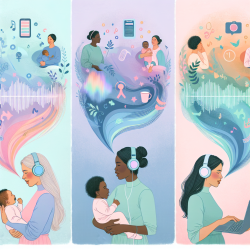The recent study titled "Examining the association between diabetes, depressive symptoms, and suicidal ideation among Aboriginal Canadian peoples living off-reserve" sheds light on a critical intersection of health issues affecting Aboriginal communities in Canada. This research highlights the need for practitioners to integrate mental health screening into diabetes care for these populations.
The Research Findings
The study conducted a cross-sectional analysis using data from the Aboriginal Peoples Survey, 2012. It found that Aboriginal Canadians with diabetes living off-reserve are at a significantly higher risk of experiencing depressive symptoms and suicidal ideation compared to their non-diabetic counterparts. Specifically, 17.53% of diabetic participants reported depressive symptoms versus 11.12% of non-diabetics. Similarly, 23.86% of diabetics reported suicidal ideation compared to 18.71% of non-diabetics.
Implications for Practitioners
These findings underscore the importance of incorporating mental health assessments into routine diabetes care for Aboriginal patients. Practitioners should consider the following strategies:
- Culturally Sensitive Screening: Develop and implement screening tools that are culturally appropriate and resonate with Aboriginal values and beliefs.
- Integrated Care Models: Collaborate with mental health professionals to create integrated care plans that address both physical and mental health needs.
- Community Engagement: Engage with community leaders and members to build trust and ensure that interventions are community-driven and accepted.
- Education and Training: Provide ongoing education for healthcare providers on the unique challenges faced by Aboriginal populations related to diabetes and mental health.
The Role of Socioeconomic Factors
The study also highlights the role of socioeconomic status (SES) as a contributing factor to both diabetes and depression. Lower levels of education, income disparities, and limited access to healthcare services exacerbate these conditions. Practitioners should advocate for policies that address these social determinants of health to improve overall outcomes for Aboriginal patients.
Encouraging Further Research
The study calls for further research to explore the biological and psychological mechanisms linking diabetes with depression and suicidal ideation. Longitudinal studies could provide insights into the progression of these conditions over time and help identify effective intervention strategies.
A Call to Action
Practitioners are encouraged to take proactive steps in addressing the mental health needs of their Aboriginal diabetic patients. By implementing culturally sensitive co-screening strategies, healthcare providers can play a pivotal role in reducing the burden of depression and suicidal behavior in this vulnerable population.
To read the original research paper, please follow this link: Examining the association between diabetes, depressive symptoms, and suicidal ideation among Aboriginal Canadian peoples living off-reserve: a cross-sectional, population-based study.










